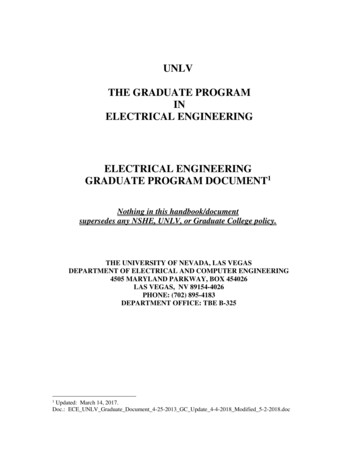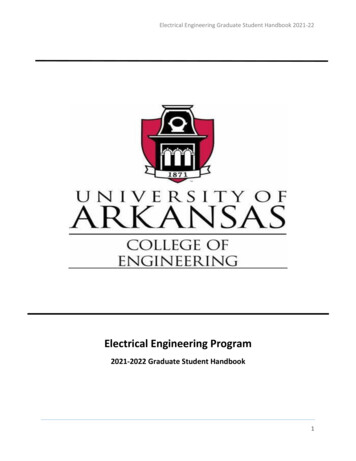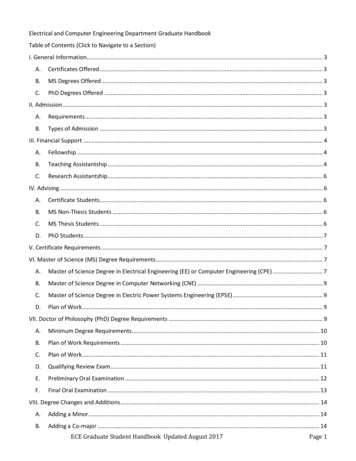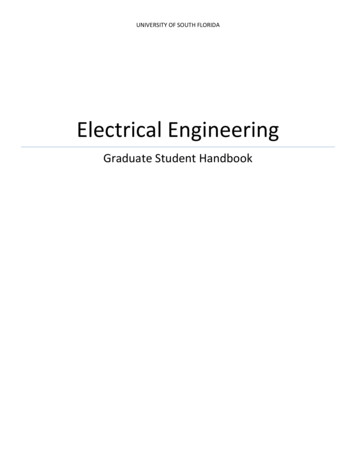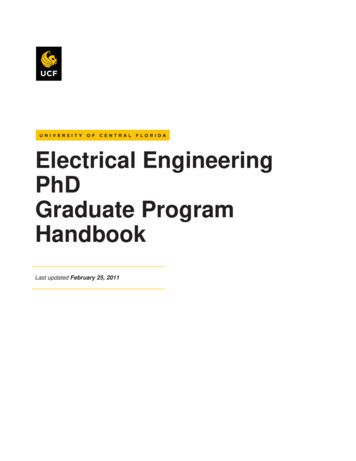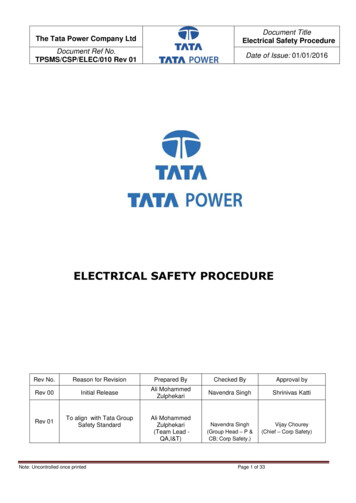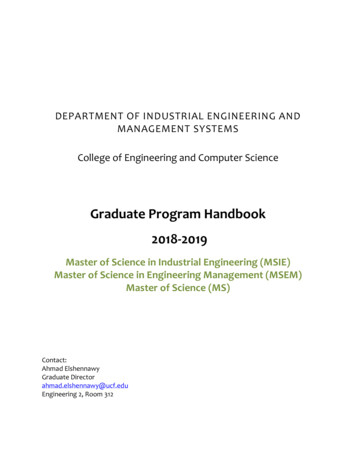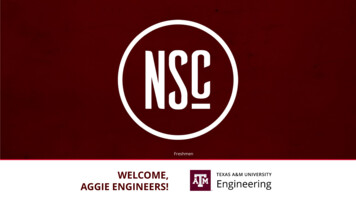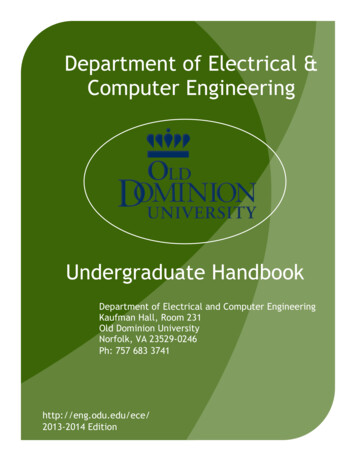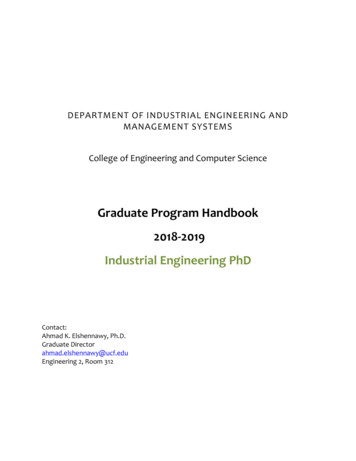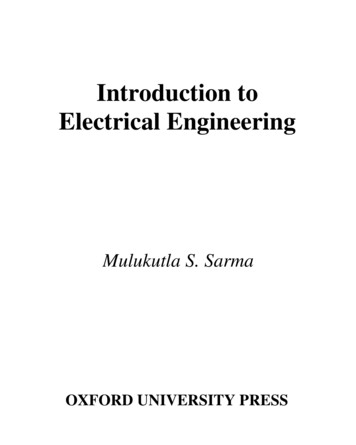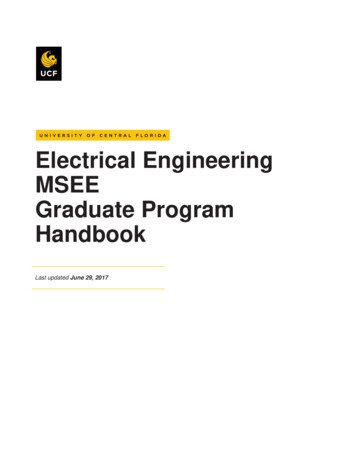
Transcription
Electrical EngineeringMSEEGraduate ProgramHandbookLast updated June 29, 2017
Table of ContentsIntroduction .1MS Degree .1Curriculum .2Timeline for Completion .2Advising/Mentoring .2Roles and Responsibilities.2Plan of Study (POS) .3Transfer of Credit .3A typical non-thesis MS degree program (concentration area: Signal Processing and Systems) .4Thesis Requirements .4University Dissertation Requirements .4Thesis Enrollment .5Thesis Advisory Committee Membership .5Portfolio Requirements .5Graduate Research .5Department Research.6Financial Support .6Funding Requirements .6Graduate Student Associations .7ECE Student Organizations .7The Graduate Student Association (GSA).7Professional Development .7Instructor Training and Development .8Pathways to Success Workshops .8Graduate Research Forum .8Graduate Excellence Awards .8Other .9Job Search .9Forms .9Useful Links . 10Grad Faculty . 10Contact Info . 15Electrical Engineering MSEE Program Handbooki
Electrical Engineering MSEETogether, the Graduate Student Handbook and your graduate program handbook should serve as your mainguide throughout your graduate career. The Graduate Student Handbook includes university information, policies,requirements and guidance for all graduate students. Your program handbook describes the details aboutgraduate study and requirements in your specific program. While both of these handbooks are wonderfulresources, know that you are always welcome to talk with faculty and staff in your program and in the GraduateCollege.The central activities and missions of a university rest upon the fundamental assumption that all members of theuniversity community conduct themselves in accordance with a strict adherence to academic and scholarlyintegrity. As a graduate student and member of the university community, you are expected to display the higheststandards of academic and personal integrity.Here are some resources to help you better understand your responsibilities: Academic HonestyAcademic Integrity Training - Open to all graduate students at no costPlagiarismIntroductionElectrical Engineering is one of the oldest disciplines in Engineering, but it has considerably evolved over theyears. Students in UCF’s Master of Science in Electrical Engineering receive a broad background in areas suchas communications, controls/robotics, digital signal processing, electromagnetics, power electronics andelectronics, electro-optics/photonics, solid state and microelectronics, and very large-scale integration (VLSI)while specializing in a research area of their interest.Please visit the EEMS Program for detailed description of degree requirements. A current list of EE courses canbe found at Graduate EE Courses. Typically, students can begin registering for Summer, Fall, and Spring of thefollowing year in mid-late March. See UCF Registration Practices to get an idea of how to do this. In all programs,students must maintain a 3.0 GPA or better in all coursework taken since admission into the program.Master's students may choose one of two options – the thesis option or the non-thesis option. Both are 30semester-hour programs. The latter requires slightly more coursework and, of course, does not require that athesis be written. MS non-thesis option students must, in their last term, submit to the ECE Graduate Committee,a portfolio detailing all major activities in which they have participated as a result of their tenure in the program.This should include a SASS audit, resume, and details of term papers, and projects that they have completed aspart of their coursework.MS Degree At least 30 semester hours of credit at the 5000-6000 level. At least half of these must be at the 6000level, and under no circumstances can they contain Doctoral Research credit or undergraduate credit.Up to 6 credit hour of approved independent study may be counted toward degree requirements.Most of the courses should be taken from one of the technical areas of concentration, listed in theGraduate Catalog. The EE areas of concentration are: Electromagnetics and Optics (EO), MicroSystems and Nano-Systems (MNS), and Signal Processing and Systems (SPS).Although there are no specific required courses in the EE areas of concentration, an MS student musthave his or her Plan of Study approved by the graduate coordinator before the completion of 9 credithours into the program.Electrical Engineering MSEE Program Handbook1
The thesis option requires 24 credit hours of electives plus 6 credit hours of thesis research (EEL6971).The non-thesis option requires 30 credit hours of electives and a culminating portfolio.In addition to coursework and thesis work (for thesis students), all students should also be engaged in reviewingand analyzing contemporary research in a student’s particular specialization within the profession in order to helpstudents acquire knowledge and skills pertaining to research-based best practices in that specialization area. Thiscan be accomplished through Directed Research and Independent Study courses.CurriculumPlease visit the Graduate Catalog to see the current curriculum for our program.Timeline for CompletionStudents must follow a prescribed, yet flexible path, achieving milestones along the way. Although there is noguarantee that each student will be able to complete all the requirements, if a student is hard working and diligent,and is a full-time graduate student, he or she should be able to complete a master’s program within 1 to 2 years.For non-thesis master’s students who are working full-time and going to school part-time, it may take 4 to 6 yearsto earn the degree.Advising/MentoringAdvising and mentoring are two very important elements in a graduate student’s career. Upon acceptance into theCpE program, graduate students are assigned an academic adviser. This person advises the student on courseselections during the early stages of the student’s graduate career. For thesis-option MS students, the academicadviser needs to be rapidly replaced by a research adviser who serves as course adviser and research mentor.The research adviser may or may not be the person initially assigned as academic adviser, depending primarilyon the research path the student chooses.The student/research adviser relationship is not irrevocable for either the student or the faculty member. The mostcommon reason for change is incompatibility of research agendas between the adviser and the student. For thisreason, students should not only talk to potential advisers, but also to students already in the adviser’s researchgroup to learn first-hand the dynamics of the group and the expectations of students in the group. While changesare natural and acceptable, we highly discourage students to jump from one adviser to another, especially whenthere is financial support involved. Moreover, when a student starts a research project with an adviser, thatstudent has a professional obligation to complete the agreed-upon research tasks to the best of his or hercapabilities, leaving everything in a state that makes it easy for another student to continue the work. Additionally,the student has a moral obligation to not use the unpublished research results of one adviser’s group whenmoving to another group, unless that is agreed upon by the first adviser. Of course, this does not preclude use ofpublished results or of general knowledge gained in the research area and its accepted practices, results andtools.Roles and ResponsibilitiesFaculty Adviser The adviser helps the student select which courses to take.The adviser (in consultation with the student) develops the student’s plan of study.The adviser directs the student’s research.For MS thesis option, the adviser reviews and approves the student’s thesis.The adviser often provides financial support for the student (based on a research grant).Electrical Engineering MSEE Program Handbook2
Student The student takes coursework as required, maintaining a minimum 3.0 GPA.The student maintains a full course load and works diligently to complete all requirements in a timelymanner.The student (in consultation with the faculty adviser) develops a plan of study prior to completing thefirst 9 hours of coursework.The student identifies (in consultation with the faculty adviser) a suitable research topic.The student works in the lab or field or other venue as needed to complete his or her research.The student is responsible for knowing and meeting all university deadlines, rules, and regulations –see the section titled Student Responsibilities in the Graduate Catalog.If a student wants to change faculty advisers, the student should discuss the situation with his or hercurrent faculty adviser first, and then request the change through the graduate coordinator. Thechange must be approved by the current faculty adviser, the new faculty adviser, and the graduatecoordinator.Plan of Study (POS)The Plan of Study (POS), sometimes referred to as the Plan of Study, is an agreement between the student andthe program listing requirements for completing the degree. All Electrical Engineering graduate students musthave an approved Plan of Study (POS) developed by the student and his or her adviser that lists the specificcourses to be taken as part of the degree. The student must maintain a minimum GPA of 3.0 in his or her POS,as well as in all coursework taken since entering the program.No coursework can appear on a POS that is more than 7 years old at the time of graduation.The POS must be filed prior to the completion of 9 credit hours after admission to the program. This is mandatory.The College of Graduate Studies automatically places a "hold" on future registration for noncompliance. The POScan, and usually will, be revised later to reflect changes in the courses actually taken, but it is crucial that a POSbe on file, signed by the student and the faculty adviser, and approved by the Graduate Program Coordinator.Any variation from the current POS must be approved by research adviser and Graduate Program Coordinatorand then immediately reflected in an updated POS.The POS for students is flexible and unique to each student. However, it must meet university, college, anddepartment rules for minimum number of hours, etc. (see Program Requirements, above).A student should periodically review his/her GPS report (Degree Audit) to track the ‘official’ progress towardshis/her degree. Visit my.ucf.edu, and from your home page choose the Graduate Plan of Study under the "DegreeAudit” section on the lower right hand corner of the page.Transfer of CreditMS students, with the approval of their adviser and the graduate coordinator, can transfer up to 9 credit hours, ofB grade (3.0) or better, in graduate coursework (no Independent Study/Thesis credit) from another program atUCF or from an regionally accredited institution. This must appear on the initial POS submitted by the studentwithin their first 9 credit hours in the CpE graduate program.In no case can courses with a grade below a B (3.0) be transferred, nor can undergraduate credit.Electrical Engineering MSEE Program Handbook3
A typical non-thesis MS degree program (concentration area: SignalProcessing and Systems)1st Year of Graduate TrainingFallSpring EEL 5542 Random Processes IEEL 5513 Digital Signal ProcessingApplicationsEEL 5630 Digital Control SystemsSemester Total: 9 credit hours EEL 6530 Communication TheoryEEL 6502 Adaptive Digital Signal ProcessingApplicationsEEL 6616 Adaptive ControlSemester Total: 9 credit hours2nd Year of Graduate TrainingFallSpring EEL 5820 Image ProcessingEEL 6938 Independent StudySemester Total: 6 credit hours Study EEL 6823 ImageProcessing IIIEEL 6938 IndependentStudySemester Total: 6 credit hoursThesis RequirementsThe thesis is the culminating or comprehensive experience for those who conduct an original research study aspart of a thesis-option program. An oral defense of the thesis is required. The approved thesis must be writtenand prepared in accordance with program, college, and university requirements. The College of Engineering andComputer Science requires that all thesis defense announcements are approved by the student's adviser andposted on the college's website and on the university-wide Events Calendar at the College of Graduate Studieswebsite at least two weeks before the defense date. A final electronic copy of the thesis must be submitted to theUCF College of Graduate Studies by the dates shown in the Academic Calendar.University Dissertation RequirementsA thesis is optional for this program; the following information is intended for those choosing tocomplete a thesis.The College of Graduate Studies Thesis and Dissertation page contains information on the university’srequirements for dissertation formatting, format review, defenses, final submission, and more. A step-by-stepcompletion guide is also available on Thesis and Dissertation Services Site.All university deadlines are listed in the Academic Calendar. Your program or college may have other earlierdeadlines; please check with your program and college staff for additional deadlines.The following requirements must be met by dissertation students in their final term: Submit a properly formatted file for initial format review by the format review deadlineSubmit the Thesis and Dissertation Release Option form well before the defenseDefend by the defense deadlineReceive format approval (if not granted upon initial review)Electrical Engineering MSEE Program Handbook4
Submit signed approval form by final submission deadlineSubmit final dissertation document by final submission deadlineStudents must format their dissertation according to the standards outlined in Thesis and Dissertation Webcourse.Formatting questions or issues can be submitted to the Format Help page in the Thesis and Dissertation Servicessite. Format reviews and final submission must be completed in the Thesis and Dissertation Services site. TheDissertation Approval Form is also available in the Thesis and Dissertation Services site.The College of Graduate Studies offers several thesis and dissertation Workshops each term. Students are highlyencouraged to attend these workshops early in the dissertation process to fully understand the above policies andprocedures.The College of Graduate Studies thesis and dissertation office is best reached by email at editor@ucf.edu.Thesis EnrollmentThesis students who are full time must continue to enroll in three credit hours of thesis course work eachsemester until the thesis requirement is satisfied, beyond the minimum of 6 credit hours of thesis, but only 6 hourstotal will count toward the degree requirement.Thesis Advisory Committee MembershipA student writing a thesis must have a Thesis Advisory Committee consisting of at least three members who areapproved members of the Graduate Faculty or Graduate Faculty Scholars(catalog.ucf.edu/content.php?catoid 4&navoid 240). To learn more about committee membership eligibility andresponsibilities, please contact your program advisor or visit the Graduate Catalog.Portfolio RequirementsAs a culminating experience, non-thesis students are also required to submit a portfolio of activities to thedesignated EE Graduate Coordinator in a semester prior to their intended graduation. The portfolio contains thestudent’s resume and completed graded assignments of extended projects that the student has completed as partof his or her course work, or independent studies, that were conducted during their tenure in the MSEE program.This portfolio will be evaluated by an appropriate ECE committee and a “Satisfactory” or “Unsatisfactory” gradewill be assigned. An appropriate plan to remedy an “Unsatisfactory” grade will be provided to the student whoreceives such a grade.Graduate ResearchUCF has three fundamental responsibilities with regard to graduate student research. They are to (1) support anacademic environment that stimulates the spirit of inquiry, (2) develop the intellectual property stemming fromresearch, and (3) disseminate the intellectual property to the general public. Students are responsible for beinginformed of rules, regulations and policies pertaining to research. Below are some general policies and resources.Research Policies and Ethics Information: UCF's Office of Research and Commercialization ensures the UCFcommunity complies with local, state and federal regulations that relate to research. For polices including requiredInstitutional Review Board (IRB) approval when conducting research involving human subjects (e.g. surveys),animal research, conflict of interest and general responsible conduct of research, please see theirwebsite: research.ucf.edu/ Compliance.UCF’s Patent and Invention Policy: In most cases, UCF owns the intellectual property developed usinguniversity resources. The graduate student as inventor will according to this policy share in the proceeds of theElectrical Engineering MSEE Program Handbook5
invention. Please see the current UCF Graduate Catalog for details: catalog.ucf.edu/index.php?catoid 4 Policies General Graduate Policies.Department ResearchResearch interests of the Electrical Engineering faculty include antennas, microwave and millimeter circuits anddevices, communication systems, digital signal/image processing, power electronics, electronic circuits, IFFdevices, electromagnetic theory, radar and microwave remote sensing, speech processing, VLSI design, spreadspectrum systems, SAW and ACT devices, spectral estimation, solid state device modeling and computer-aideddesign (CAD) techniques, communication networks, integrated services digital networks, neural networks,systems and controls, robotics, robust control, computer control, microelectronics, semiconductors, thin films,power system stability, bipolar device modeling, solid state lasers, optical propagation, fiber optics, optical signalprocessing, laser-induced damage, optical testing, diffractive optics, phase conjunction, infrared detectors, Fourieroptics, lens design, and nonlinear optics.Visit the “Our Research” and the “Industry” sections of the Electrical and Computer Engineering website foradditional information.Financial SupportFinancial support is a major concern for graduate students, especially since many rely on financial support fromthe university to pursue graduate study. In combination, the college, the university, and the department providefinancial assistance to graduate students in several ways: Fellowships and Scholarships - Available to academically outstanding students.Graduate Teaching Assistantships – GTAs are available for grading, recitation instruction, orlaboratory teaching.Graduate Research Assistantships – GRAs (for participating in sponsored faculty directedresearch) are available depending on the current funding levels of the faculty.Graduate students may also receive financial assistance through tuition support or loans. For more information,see the Office of Student Financial Assistance, which describes the types of financial assistance available at UCFand provides general guidance in planning your graduate finances. The Financial Information section of theGraduate Catalog is another key resource.Funding Requirements All students must maintain a 3.0 GPA in their Plan of Study, as well as overall courses taken sinceentering the program. They must not receive more than two grades below B (3.0), and those must bebalanced to maintain the 3.0 overall. Students on assistantship agreements are expected to work 10to 20 hours per week on their assigned tasks (whether it be grading, teaching, or research), whilethey are maintaining satisfactory progress in completing their academic courses. Note thatsatisfactory progress for a supported student is not the same as maintaining the minimum grades, orjust barely performing at research. Financial support is a privilege not a right.Students must meet their obligations and maintain satisfactory work as defined by their supervisor tocontinue to receive financial support. Also, students must register for the proper number of credithours in a timely manner to allow the processing of tuition remission.The duration of financial support may vary from one semester to another.Mandatory training requirements must be met for a student to be hired in the position of GraduateTeaching Associate, Assistant or Grader. The training, offered by UCF’s Faculty Center for Teachingand Learning, covers course design, learning theories, ethics, and other topics relevant to preparingGTAs for their responsibilities. See graduate.ucf.edu/graduate-teaching/ for training requirements andregistration instructions.Electrical Engineering MSEE Program Handbook6
Students who are non-native speakers of English and do not have a degree from a U.S. institutionmust pass the SPEAK test before they will be permitted to teach as Graduate Teaching Associates(position code 9183) or Graduate Teaching Assistants (position code 9184). The SPEAK test is notrequired for students who will be appointed as a Graduate Teaching Grader (position code 9187).Additional information including how to register for the test can be accessed through the GraduateTeaching section of the College of Graduate Studies student website.International students are expected to be here as full-time students, and may not work off campusexcept under certain strict conditions. For information about the types of employment available tointernational students and the requirements and restrictions based on visa type, see the InternationalServices Center’s website: global.ucf.edu/ Students Employment.Graduate Student AssociationsECE Student OrganizationsThe oldest and largest educational and scientific computing society is the Association of ComputingMachinery (ACM) which offers student memberships for 19 per year. The local chapter is at UCF ACM Chapter.Female students in our school have formed Women in EECS/WIE and host many activities important to women ina scientific and technical area, including an active mentoring program. Membership is free.Other ECE Student Organizations UPE Honor Society for Computer Science and Information Technology StudentsIEEE UCF Student BranchThe Graduate Student Association (GSA)GSA is UCF's graduate organization committed to enrich graduate students' personal, educational andprofessional experience. To learn more or get involved, please visit facebook.com/groups/UCFgsa/. For individualdepartment or graduate program organizations, please see program adviser.Professional DevelopmentA graduate student’s professional development goes beyond completing course work, passing exams, conductingresearch for a thesis or dissertation, and meeting degree requirements. Professional development also involvesdeveloping the academic and nonacademic skills needed to become successful in the field of choice. UCF has an active professional development program for graduate students, including theProfessoriate Program, sponsored by Faculty Center for Teaching and Learning (FCTL), the GTACertificate Program, sponsored by FCTL, the Pathways to Success, the Graduate Research forum,sponsored by the College of Graduate Studies, and special award recognitions such as the Award forExcellence by a Graduate Teaching Assistant, the Award for Excellence in Graduate StudentTeaching, the Award for the Outstanding Master’s Thesis, and the Award for the Innovative Thesis orDissertation (see below for additional information).The university has active student chapters of the Association of Computing Machinery and the IEEE.The cost for student membership in the national organizations is subsidized by professionalmemberships. This is a “bargain” that no student should pass up.ECE sponsors regular colloquia talks by leading researchers in the discipline. All students arestrongly encouraged to attend as many as feasible within the constraints of their courses and otheracademic obligations.Various research groups hold their own seminars in which students present their research in front ofother members of their research group.Students are expected to publish the results of their research.Electrical Engineering MSEE Program Handbook7
Graduate students in ECE are encouraged to present papers at conferences. Often their facultymentor will be able to fund one or more such opportunities. The School of ECE, the College ofGraduate Studies and the Student Government Association are other sources of such support. Toreview the College of Graduate Studies award requirements and apply online, see graduate.ucf.edu/ Graduate Travel Awards.Graduate students in ECE are also encouraged to participate in summer research internships whenthis is compatible with their research agendas – see your research adviser for more information andguidelines.Instructor Training and DevelopmentThe Faculty Center for Teaching and Learning (FCTL) promotes excellence in all levels of teaching at theUniversity of Central Florida. They offer several programs for the professional development of Graduate TeachingAssistants at UCF. GTA Training (mandatory for employment as a GTA)This training provides information and resources for students who will be instructors in a two-dayworkshop. The seminars cover a variety of topics, including course development, learning theories,lecturing, and academic freedom. Those interested in additional training can also attend an optionaltraining session that normally follows the mandatory training.Preparing Tomorrow's Faculty ProgramThis certificate program (12-weeks) consists of group and individualized instruction by Faculty Centerstaff and experienced UCF pr
Electrical Engineering MSEE Program Handbook 3 Student The student takes coursework as required, maintaining a minimum 3.0 GPA. The student maintains a full course load and works di
